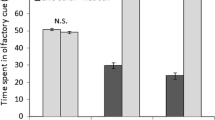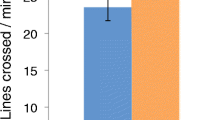Abstract
We tested the effect of near-future CO2 levels (≈490, 570, 700, and 960 μatm CO2) on the olfactory responses and activity levels of juvenile coral trout, Plectropomus leopardus, a piscivorous reef fish that is also one of the most important fisheries species on the Great Barrier Reef, Australia. Juvenile coral trout reared for 4 weeks at 570 μatm CO2 exhibited similar sensory responses and behaviors to juveniles reared at 490 μatm CO2 (control). In contrast, juveniles reared at 700 and 960 μatm CO2 exhibited dramatically altered sensory function and behaviors. At these higher CO2 concentrations, juveniles became attracted to the odor of potential predators, as has been observed in other reef fishes. They were more active, spent less time in shelter, ventured further from shelter, and were bolder than fish reared at 490 or 570 μatm CO2. These results demonstrate that behavioral impairment of coral trout is unlikely if pCO2 remains below 600 μatm; however, at higher levels, there are significant impacts on juvenile performance that are likely to affect survival and energy budgets, with consequences for predator–prey interactions and commercial fisheries.


Similar content being viewed by others
References
Baumann H, Talmage SC, Gobler CJ (2012) Reduced early life growth and survival in a fish in direct response to increased carbon dioxide. Nat Clim Chang 2:38–41
Brauner CJ, Baker DW (2009) Patterns of acid–base regulation during exposure to hypercarbia in fishes. In: Glass ML, Wood SC (eds) Cardio-respiratory control in vertebrates. Springer, Berlin, pp 43–63
Cripps IL, Munday PL, McCormick MI (2011) Ocean Acidification Affects Prey Detection by a Predatory Reef Fish. PLoS One 6 e22736. doi:10.1371/journal.pone.0022736
Devine B, Munday PL, Jones GP (2012) Homing ability of adult cardinalfish is affected by elevated carbon dioxide. Oecologia 168:269–276
Dickson AG, Millero FJ (1987) A comparison of the equilibrium constants for the dissociation of carbonic acid in seawater media. Deep-Sea Res Part A 34:1733–1743
Dixson DL, Munday PL, Jones GP (2010) Ocean acidification disrupts the innate ability of fish to detect predator olfactory cues. Ecol Lett 13:68–75. doi:10.1111/j.1461-0248.2009.01400.x
Domenici P, Allan B, McCormick MI, Munday PL (2012) Elevated carbon dioxide affects behavioural lateralization in a coral reef fish. Biol Lett 8:78–81. doi:10.1098/rsbl.2011.0591
Doney SC (2010) The growing human footprint on coastal and open-ocean biogeochemistry. Science 328:1512–1516. doi:10.1126/science.1185198
Esbaugh AJ, Heuer R, Grosell M (2012) Impacts of ocean acidification on respiratory gas exchange and acid–base balance in a marine teleost Opsanus beta. J Comp Physiol B. doi:10.1007/s00360-012-0668-5
Ferrari MCO, Dixson DL, Munday PL, McCormick MI, Meekan MG, Sih A, Chivers DP (2011a) Intrageneric variation in antipredator responses of coral reef fishes affected by ocean acidification: implications for climate change projections on marine communities. Glob Chang Biol 17:2980–2986. doi:10.1111/j.1365-2486.2011.02439.x
Ferrari MCO, McCormick MI, Munday PL, Meekan MG, Dixson DL, Lonnstedt O, Chivers DP (2011b) Putting prey and predator into the CO2 equation—qualitative and quantitative effects of ocean acidification on predator-prey interactions. Ecol Lett 14:1143–1148. doi:10.1111/j.1461-0248.2011.01683.x
Frommel AY, Maneja R, Lowe D, Malzahn AM, Geffen AJ, Folkvord A, Piatkowski U, Reusch TBH, Clemmesen C (2012) Severe tissue damage in Atlantic cod larvae under increasing ocean acidification. Nat Clim Chang 2:42–46. doi:10.1038/CLIMATE1324
Gerlach G, Atema J, Kingsford MJ, Black KP, Miller-Sims V (2007) Smelling home can prevent dispersal of reef fish larvae. Proc Natl Acad Sci USA 104:858–863. doi:10.1073/pnas.0606777104
Hari P, Pumpanen J, Huotari J, Kolari P, Grace J, Vesala T, Ojala A (2008) High-frequency measurements of productivity of planktonic algae using rugged nondispersive infrared carbon dioxide probes. Limnol Oceanogr Meth 6:347–354
Hilmi N, Allemand D, Dupont S, Safa A, Haraldsson G, Nunes PD, Moore C, Hattam C, Reynaud S, Hall-Spencer JM, Fine M, Turley C, Jeffree R, Orr J, Munday PL, Cooley S (2012) Towards improved socio-economic assessments of ocean acidification’s impacts? Mar Biol. doi:10.1007/s00227-012-2031-5
Hixon MA, Webster MS (2002) Density dependence in reef fish populations. In: Sale PF (ed) Coral reef fishes: dynamics and diversity in a complex ecosystem. Academic Press, San Diego, pp 303–325
Ishimatsu A, Hayashi M, Kikkawa T (2008) Fishes in high-CO2, acidified oceans. Mar Ecol-Prog Ser 373:295–302. doi:10.3354/meps07823
Leis JM, Carson-Ewart BM (1999) In situ swimming and settlement behaviour of larvae of an Indo-Pacific coral-reef fish, the coral trout Plectropomus leopardus (Pisces: Serranidae). Mar Biol 134:51–64. doi:10.1007/s002270050524
Mapstone BD, McKinlay JP, Davies CR (1996) A description of the commercial reef line fishery logbook data held by the Queensland Fisheries Management Authority. Report to the QFMA from the CRC Reef Research Centre and the Department of Tropical Environment Studies and Geography, James Cook University, Townsville, Australia
Mehrbach C, Culberson CH, Hawley JE, Pytkowicz RM (1973) Measurement of the apparent dissociation constants of carbonic acid in seawater at atmospheric pressure. Limn Oceanogr 18:897–907
Meinshausen M, Smith S, Calvin K, Daniel J, Kainuma M, Lamarque JF, Matsumoto K, Montzka S, Raper S, Riahi K, Thompson A, Velders GJM, van Vurren DPP (2011) The RCP greenhouse gas concentrations and their extensions from 1765 to 2300. Climatic Chang 109:213–241
Melzner F, Gutowska MA, Langenbuch M, Dupont S, Lucassen M, Thorndyke MC, Bleich M, Portner HO (2009a) Physiological basis for high CO2 tolerance in marine ectothermic animals: pre-adaptation through lifestyle and ontogeny? Biogeosciences 6:2313–2331
Melzner F, Göbel S, Langenbuch M, Gutowska MA, Pörtner HO, Lucassen M (2009b) Swimming performance in Atlantic Cod (Gadus morhua) following long-term (4–12 months) acclimation to elevated seawater PCO2. Aquatic Toxicol 92:30–37
Miller GM, Watson S, Donelson JM, McCormick MI, Munday PL (2012) Parental environment mediates impacts of increased carbon dioxide on a coral reef fish. Nat Clim Chang. doi:10.1038/nclimate1599
Munday PL, Dixson DL, Donelson JM, Jones GP, Pratchett MS, Devitsina GV, Doving KB (2009a) Ocean acidification impairs olfactory discrimination and homing ability of a marine fish. Proc Natl Acad Sci USA 106:1848–1852. doi:10.1073/pnas.0809996106
Munday PL, Donelson JM, Dixson DL, Endo GGK (2009b) Effects of ocean acidification on the early life history of a tropical marine fish. Proc R Soc B-Biol Sci 276:3275–3283. doi:10.1098/rspb.2009.0784
Munday PL, Dixson DL, McCormick MI, Meekan M, Ferrari MCO, Chivers DP (2010) Replenishment of fish populations is threatened by ocean acidification. Proc Natl Acad Sci USA 107:12930–12934. doi:10.1073/pnas.1004519107
Munday PL, Gagliano M, Donelson JM, Dixson DL, Thorrold SR (2011) Ocean acidification does not affect the early life history development of a tropical marine fish. Mar Ecol Progr Ser 423:211–221
Munday PL, McCormick MI, Meekan M, Dixson DL, Watson S-A, Ferrari MCO, Chivers D (2012) Selective mortality associated with variation in CO2 tolerance in a marine fish. Ocean Acidification (in press)
Nilsson GE, Dixson DL, Domenici P, McCormick MI, Sørensen C, Watson S-A, Munday PL (2012) Near-future carbon dioxide levels alter fish behaviour by interfering with neurotransmitter function. Nat Clim Chang 2:201–204
Ohde S, van Woesik R (1999) Carbon dioxide flux and metabolic processes of a coral reef, Okinawa. Bull Mar Sci 65:559–576
Pratchett MS, Munday PL, Graham NAJ, Kronen M, Pinca S, Friedman K, Brewer TD et al (2011) Vulnerability of coastal fisheries in the tropical Pacific to climate change. In: Bell JD, Johnson JE, Hobday AJ (eds) Vulnerability of Tropical Pacific fisheries and aquaculture to climate change. Secretariat of the Pacific Community, Noumea, pp 493–576
Ruttenberg BI, Hamilton SL, Walsh SM, Donovan MK, Friedlander A, DeMartini E, Sala E, Sandin SA (2011) Predator-Induced Demographic Shifts in Coral Reef Fish Assemblages. PLoS One 6 21062. doi:e2106210.1371/journal.pone.0021062
Shamberger KEF, Feely RA, Sabine CL, Atkinson MJ, DeCarlo EH, Mackenzie FT, Drupp PS, Butterfield DA (2011) Calcification and organic production on a Hawaiian coral reef. Mar Chem 127:64–75. doi:10.1016/j.marchem.2011.08.003
Shaw EC, McNeil BI, Tilbrook B (2012) Impacts of ocean acidification in naturally variable coral reef flat ecosystems. J Geophys Res-Oceans 117:C03038. doi:10.1029/2011JC007655
Simpson SD, Munday PL, Wittenrich ML, Manassa R, Dixson DL, Gagliano M, Yan HY (2011) Ocean acidification erodes crucial auditory behaviour in a marine fish. Biol Lett 7:917–920. doi:10.1098/rsbl.2011.0293
Welch DJ, Mapstone BD, Begg GA (2008) Spatial and temporal variation and effects of changes in management in discard rates from the commercial reef line fishery of the Great Barrier Reef, Australia. Fish Res 90:247–260. doi:10.1016/j.fishres.2007.10.023
Wen CK, Pratchett MS, Almany GR, Jones GP (2012) Patterns of recruitment and microhabitat associations for three predatory coral reef fishes on the southern Great Barrier Reef, Australia. Coral Reefs (in press)
Acknowledgments
We thank staff at James Cook University’s Marine Aquarium Facility and the Queensland Government’s Northern Fisheries Centre for logistical support. This research was supported by the ARC Centre of Excellence for Coral Reef Studies, the Australian Research Council and the adaptation research network for marine biodiversity and resources (NCCARF).
Author information
Authors and Affiliations
Corresponding author
Additional information
Communicated by S. Dupont.
Rights and permissions
About this article
Cite this article
Munday, P.L., Pratchett, M.S., Dixson, D.L. et al. Elevated CO2 affects the behavior of an ecologically and economically important coral reef fish. Mar Biol 160, 2137–2144 (2013). https://doi.org/10.1007/s00227-012-2111-6
Received:
Accepted:
Published:
Issue Date:
DOI: https://doi.org/10.1007/s00227-012-2111-6




